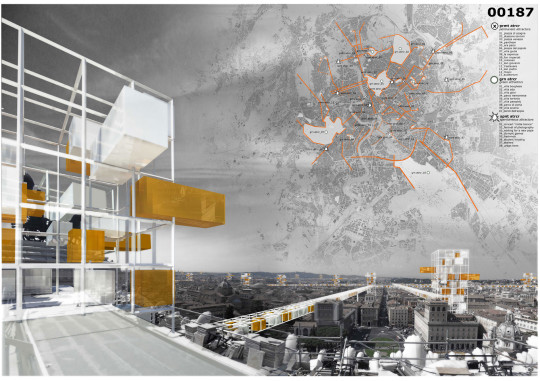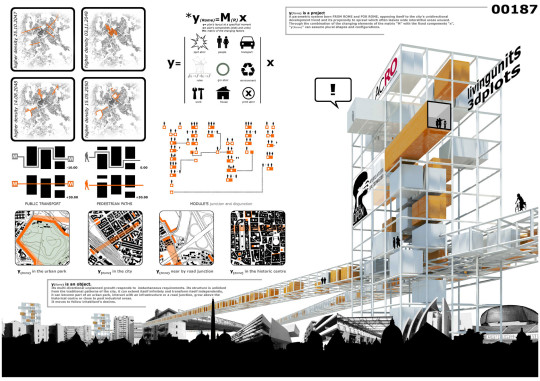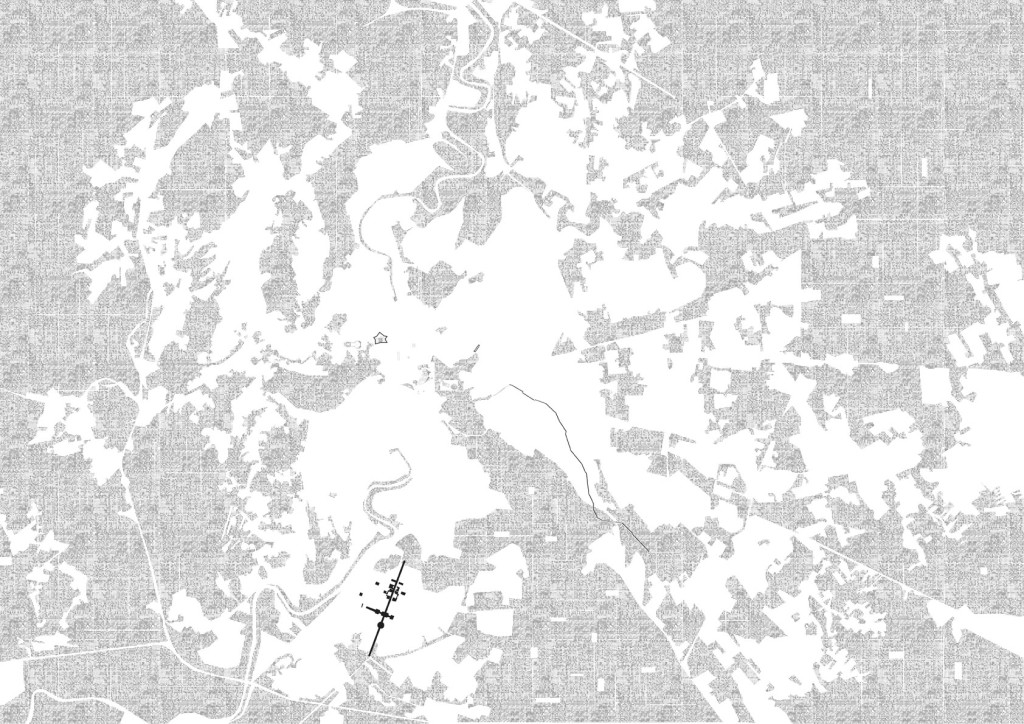Info:
Title: *y(Rome) = M·x - Code: 00187Contest: Rome / 2010
By: P. Bellucci / L. Bochicchio / E. Capiato
Views: 4035 Likes: 1
Votes:
JUERGEN MAYER H. 0 FRANCESCO LIPARI6 FELIPE ESCUDERO7 FRANCESCO GATTI 8 MICHAEL CATON 24.6
*y(Rome) = M·x


*y(Rome) = M·x
M=|SpntAtrcr, people, transport, rules, GrnAtrcr, evironment, work, house, PrmtAtrcr|
x= fixed grid (3d plots and housing elements)
y(Rome) is a project
A parametric system born FROM ROME and FOR ROME, opposing itself to the city’s unidirectional development trend and its propensity to sprawl which often leaves wide interstitial areas unused.
Through the combination of the changing elements of the matrix “M” with the fixed components “x”, y(Rome) can assume plural shapes and configurations.
y(Rome) is an object.
Its multi-directional unplanned growth responds to instantaneous requirements.
Its structure is unlinked from the traditional patterns of the city, it can extend itself infinitely and transform itself independently, it can become part of a urban park, interact with an infrastructure or a road junction, grow above the historical centre or spread around a post industrial areas.
It moves to follow inhabitant’s desires.
It moves to follow the opportunities that Rome itself can offer:
- permanent attractors (historic centre,monuments,museums…)
- green attractors (urban parks)
- spontaneous or temporary attractors
We consider y(Rome) as the urban system of the future.
It ideally encloses the chaotic inelasticity of the contemporary city and its propensity to grow following the horizontal direction only, seeping with its modules into the territory and reversing its “chrono-stratigraphy”.
This process allows both to optimize the use of land and to make accessible those parts of the city which are now difficult to approach because of the lack of connections or the saturation of the real estate market.
The system y(Rome) is composed by a tridimensional grid-structure (the new urban plots) with a potential of infinitive growth.
The single unit (living box) can slide inside the grid.
The grid winds above Rome trough paths and panoramic towers.
This restores a perception of a city that can be seen from the top and that can be easily crossed .
The modular units (living boxes) occupy temporary positions and constantly move from one plot to the other. In this city of the future the home itself moves, becoming a sort of appendage of the human body.
The focus is on the concept of mobile housing and un-planned density.
The constant balancing beetween agglomeration and rarefaction takes place in a short time suggesting the idea of a mutable city that meets the need of flexibility, re-use and sustainability.
The constant junction and disjunction of the modules generates new fisical and social scenarios, the movable houses in the new 3d plots become in this way a mirror of society.
y(Rome) is a mean of communication
The new city is interactive from the bottom and from the inside.
From the bottom: from the streets of the traditional city people can run the system of lighted panels hanging from the towers.
The city becomes “visibly accessible”: every instant can be captured and projected on the panels through a “walk-click on-upload-show it” system.
From the inside: the inhabitants can easily move, booking their plot in an immaterial platform…the virtual net becomes the main device to enjoy the city.






